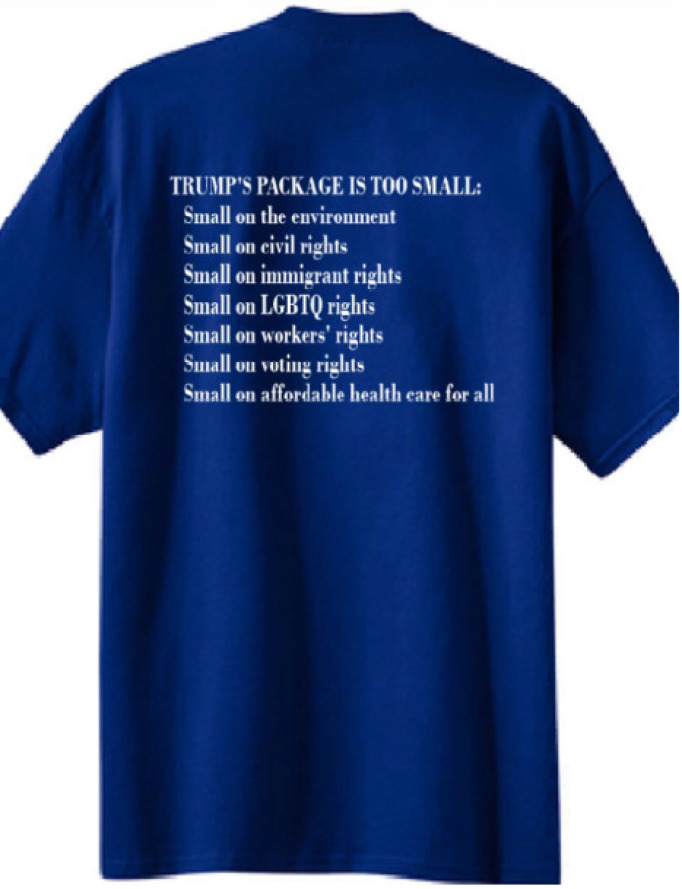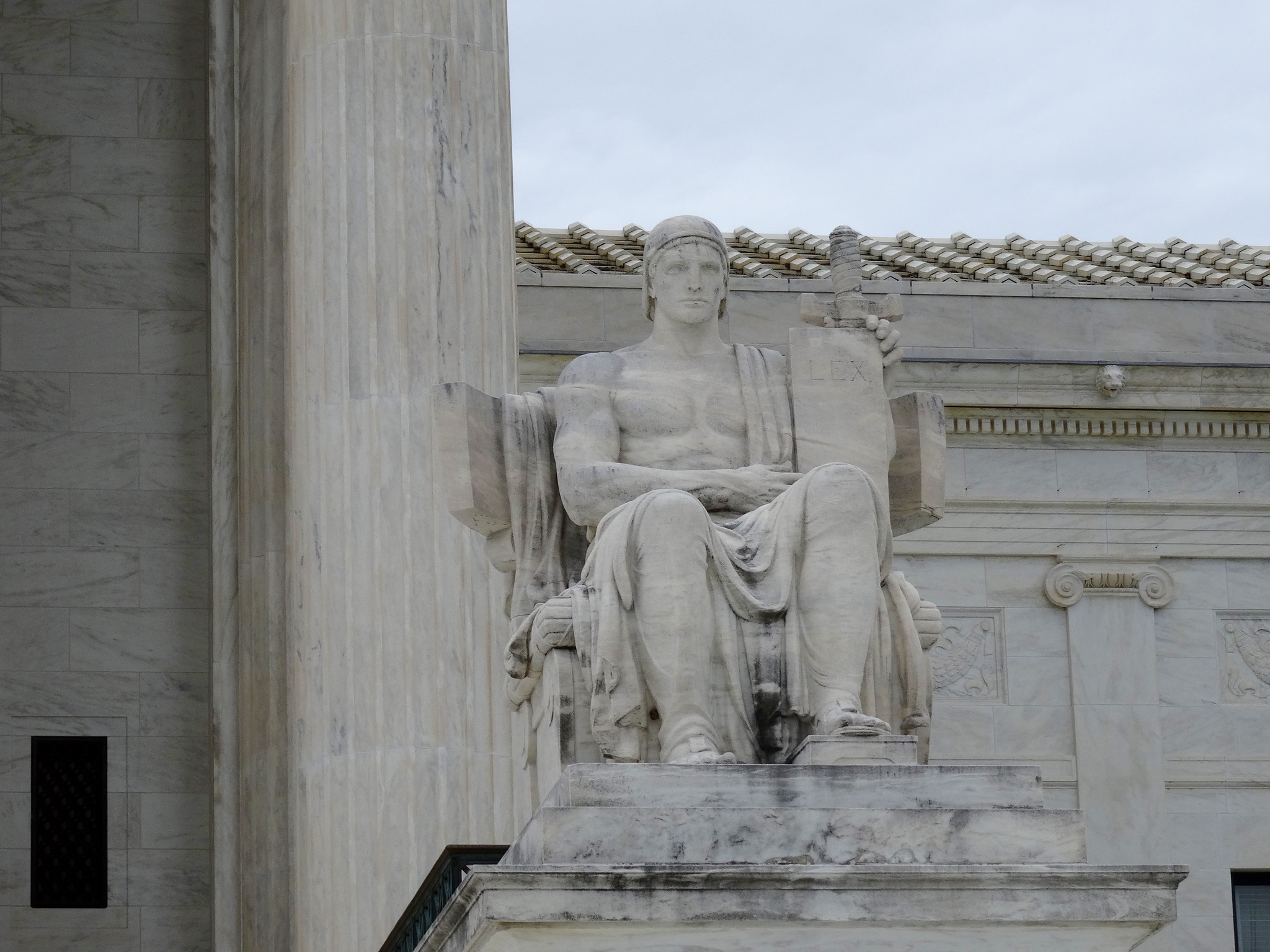SCOTUS Reverses CAFC’s ‘TRUMP TOO SMALL’ Ruling: Names Clause is Constitutional
“The Lanham Act’s names clause has deep roots in our legal tradition…. This history and tradition is sufficient to conclude that the names clause—a content-based, but viewpoint-neutral, trademark restriction—is compatible with the First Amendment.” – SCOTUS opinion
Image submitted by Elster to USPTO
The U.S. Supreme Court has reversed the U.S. Court of Appeals for the Federal Circuit’s 2022 decision in Vidal v. Elster, which held the U.S. Patent and Trademark Office’s (USPTO’s) application of Section 2(c) of the Lanham Act to reject the mark TRUMP TOO SMALL was unconstitutional. The High Court today held that the Lanham Act’s names clause does not violate the First Amendment.
While all of the justices agreed that the names clause does not violate the First Amendment, they differed on the proper analysis to reach that conclusion. Justice Thomas announced and delivered the opinion of the Court, except as to Part III. Justices Alito and Gorsuch joined the opinion in full; Justices Roberts and Kavanaugh joined all but Part III; and Justice Barrett joined Parts I, II–A, and II–B. Justice Kavanaugh filed an opinion concurring in part, joined by Roberts; Justice Barrett filed an opinion concurring in part, joined by Kagan and Sotomayor (as to parts I, II, and III-B) and Jackson (as to parts I and II). Justice Sotomayor also filed an opinion concurring in the judgment, joined by Kagan and Jackson.
Oral arguments in the case were held in November 2023, with most observers at the time concluding that the justices were unlikely to grant trademark applicant Steve Elster’s bid to register the mark TRUMP TOO SMALL for t-shirts. Unlike the Court’s recent prominent trademark decisions in Matal v. Tam and Iancu v. Brunetti, there seemed to be little controversy on the part of the justices in Vidal v. Elster over whether the First Amendment is implicated in this case.
The Court granted the petition, brought by U.S. Patent and Trademark Office (USPTO) Director Katherine Vidal, in June 2023. The petition asked “whether the refusal to register a mark under Section 1052(c) violates the Free Speech Clause of the First Amendment when the mark contains criticism of a government official or public figure.”
The Federal Circuit in February 2022 held that “applying section 2(c) to bar registration of [Steve] Elster’s mark unconstitutionally restricts free speech in violation of the First Amendment.”
Elster attempted to register the trademark TRUMP TOO SMALL for use on T-shirts, but an examiner refused the application, saying that section 2(c) bars registration of a mark that “[c]onsists of or comprises a name . . . identifying a particular living individual” without the individual’s “written consent.” While Elster argued the mark was “intended as political commentary,”—particularly, to “convey[] that some features of President Trump and his policies are diminutive”—the examiner said there is no statutory or “case law carve[] out” for “political commentary.” The examiner also rejected Elster’s argument that denying the application infringed his First Amendment rights, “finding that the registration bars are not restrictions on speech, and in the alternative, that any such restriction would be permissible.”
Separately, the examiner denied registration of the mark under section 2(a)’s false association clause, which bars registration of trademarks that “falsely suggest a connection with persons, living or dead” and further rejected a First Amendment defense in that case.
On appeal, the Trademark Trial and Appeal Board (TTAB) consolidated the two cases and affirmed the examiner’s decisions on the section 2(c) grounds alone. The Board explained that Section 2(c) has been found not to be an unconstitutional restriction on free speech because it is “narrowly tailored to advance two compelling government interests: protecting the named individual’s rights of privacy and publicity and protecting consumers against source deception.”
The Federal Circuit in its analysis cited Matal v. Tam and Iancu v. Brunetti to bolster its view that “a trademark represents ‘private, not government, speech’ entitled to some form of First Amendment protection.” The court said that “[e]ven though the government in the trademark area has not imposed an absolute prohibition on speech, Brunetti further established that denying trademark registration ‘disfavors’ the speech being regulated.” The court further concluded that “section 2(c) involves content-based discrimination that is not justified by either a compelling or substantial government interest.”
But the Supreme Court today said:
“The Lanham Act’s names clause has deep roots in our legal tradition. Our courts have long recognized that trademarks containing names may be restricted. And, these name restrictions served established principles. This history and tradition is sufficient to conclude that the names clause—a content-based, but viewpoint-neutral, trademark restriction—is compatible with the First Amendment. We need look no further in this case.”
Citing a long history of restrictions on trademarking names, the Court explained that, while the common law has allowed for a person to obtain a trademark containing their own name (though not to the exclusion of a person with the same name), “[w]e see no evidence that the common law afforded protection to a person seeking a trademark of another living person’s name,” wrote the Court.
The Court was, however, careful to note that its decision is narrow. “We do not set forth a comprehensive framework for judging whether all content-based but viewpoint-neutral trademark restrictions are constitutional,” the Court said. In the present case, the history and tradition of the names clause has established that it does not violate the First Amendment, but “[i]n a future case, we can address the ‘distinct question’ whether “a viewpoint-neutral, content-based trademark restriction” is constitutional without “such a historical pedigree.’”
The opinion addressed in Part III the views of Justices Sotomayor and Barrett in their opinions concurring-in-part, calling their methodologies “loose analogies” that are not “compelling in this case.” Sotomayor’s suggestion that “heightened scrutiny does not apply to trademark registration because it is a Government initiative or benefit” failed in the majority’s view because “Government-benefit cases are an ill fit for the names clause, and we would not graft this precedent…onto this trademark dispute.”
Justice Barrett would import the test the Court has used for a “limited public forum,” which says that “the Government “may create a forum that is limited to use by certain groups or dedicated solely to the discussion of certain subjects.” But the Court said “there is reason to doubt that the federal trademark register is analogous to a limited public forum” and “[w]e see no need to adopt a potentially fraught analogy to resolve the names clause’s constitutionality.”
Justice Kavanaugh wrote a short concurrence-in-part explaining that he joined all but Part III of the Court’s opinion because, in his view, “a viewpoint-neutral, content-based trademark restriction might well be constitutional even absent such a historical pedigree.”
Initial Reactions
JT Morris, Senior Attorney at the Foundation for Individual Rights and Expression, said that while the ruling will, in theory, make it “easier to register trademarks that flatter rather than make fun of powerful public figures… Americans shouldn’t need written permission from Donald Trump or Joe Biden just to trademark criticism.”
Fara Sunderji of Dorsey & Whitney said “the majority had a good opportunity to decide if the denial of trademark registrations restricted speech because the act of the denial is chilling, but they passed on this opportunity.” Sunderji pondered whether the decision will restrict speech – “namely political criticism in a time where the country is so divided and the 2024 candidates are starting up their engines?”
While Elster would say yes, Sunderji said that “many trademark experts and the government disagree, and in fact, they argue that trademark registrations themselves reasonably allow for restriction of speech by giving the registrant a monopoly to prevent source confusion. Granting Mr. Elster’s registration could have therefore chilled such political discourse.”
Nicole M. Jantzi of Fried Frank said the “concurrences as a whole signal disagreement among the justices about how to apply a First Amendment framework to longstanding Lanham Act restrictions” and that the Court’s “decision to apply traditional First Amendment considerations to trademark law remains puzzling.” She explained:
“Over the last decade, the Supreme Court has addressed First Amendment challenges to Lanham Act restrictions on several occasions, including Matal v. Tam, Iancu v. Brunetti, and now Vidal v. Elster. Underlying these decisions has been a set of premises that, while now well-established, are hard to maintain.
The first premise is that trademarks are speech and that, as Justice Thomas stated in his Elster majority opinion, trademarks convey a ‘message.’ But the purpose of a mark is to identify to the consuming public the source or origin of goods or services, not to convey a message. This premise has stood firm since at least the Fifth Circuit’s 1975 Boston Hockey decision, but is currently under attack in, for example, The Pennsylvania State University v. Vintage Brand (M.D. Pa.).
The second premise is that denial of Federal trademark registration is a restriction on speech. But there can be no dispute that Federal registration is not a necessary predicate to using a mark in commerce; denial of registration does not restrict the mark-user’s speech. A grant of Federal trademark registration, however, most certainly restricts the ability of others to freely use the now-registered mark. Accordingly, to the extent mark usage is speech at all, a grant of Federal registration is far more restrictive than a denial. “
Roy Gutterman of the Tully Center for Free Speech and professor of journalism at Syracuse University said he purchased a “Trump Too Small” t-shirt, which he has hanging in his office, and commented that “I suppose under today’s decision, I could now go ahead and make my own without violating Mr. Elster’s intellectual property rights.”
According to Tom Brooke of Holland & Knight, “the impact of this case is more than just political.” He said:
“Actors, musicians, and any public figure now have more control over their image/name. Those hoping to promote products or viewpoints and/or profit off the use of the name of a public figure may do so under the protections of the First Amendment, but they will not be able to claim “ownership” of a certain phrase, like TRUMP TOO SMALL, under the aegis of the Federal Trademark Statute. The question of whether someone is a public figure who cannot protect the use of his or her name or image for social or political commentary was not addressed, he says, and this distinction will remain subjective.”
Finally, Megan Bannigan of Debevoise & Plimpton said the decision provides insufficient guidance for lower courts and is likely going to cause uncertainty:
“The Supreme Court reached the correct result in this case, but Justice Thomas’s majority opinion signals inevitable instability for trademark law.
The majority’s sole reliance on history and tradition provides little guidance for lower courts deciding whether another provision of the Lanham Act-such as the bar on registering a mark that is primarily a surname or a functional mark-can survive First Amendment scrutiny. District courts are ill-equipped to decide whether such provisions are rooted in U.S. legal history and tradition, and litigants are ill-equipped to provide courts with the historical evidence they will need. History is also many times a poor guide. The historical record is often murky, and it can support divergent conclusions, which Justice Barrett made clear in writing that the Names Clause is not as well-established in U.S. legal tradition as the majority suggested. History is also fluid and not always correct.”






